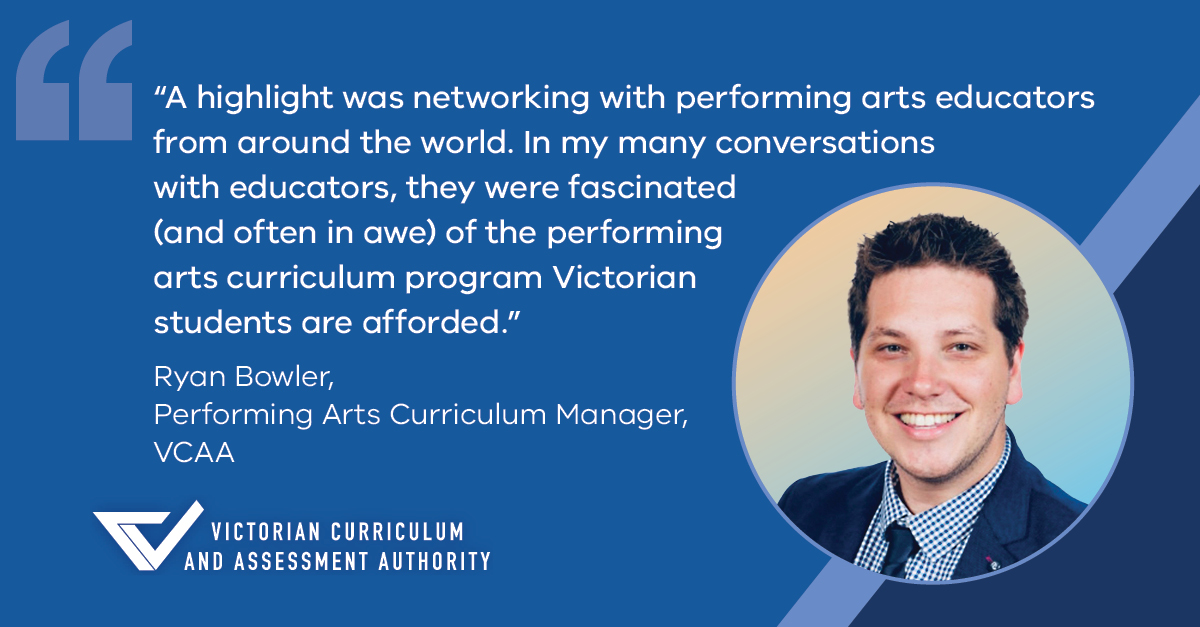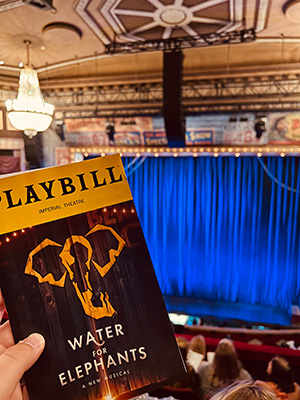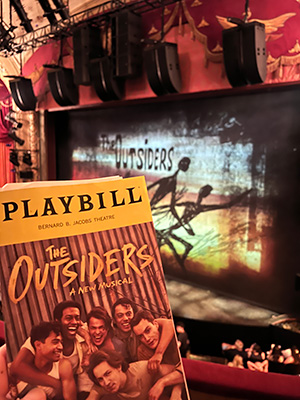
Ryan Bowler, Performing Arts Curriculum Manager
Ever wondered how we inform and develop the Victorian curriculum and senior secondary study design?
Our curriculum reflects the ever-evolving priorities and global education standards - we also gain feedback and tap into the expertise of teachers and school leaders from across the state to ensure study design and curriculum is comprehensive and meets the changing needs of students. While we use working groups, partner organisations, research, educator surveys and local thought leaders, we also look to global partners and experiences to ensure Victorian teachings are held to the highest of international education standards.
VCAA Performing Arts Curriculum Manager Ryan Bowler has looked beyond the Victorian classroom, recently venturing to New York City (NYC) – the heart of the world of performing arts – where he learnt from theatre professionals and worked with teachers, artists and creatives from across the globe. We asked Ryan to share more about his experience in NYC, including how his exploration of current best-practice on Broadway will help to inform how we teach performing arts in Victorian classrooms.
Why New York City? How did this trip contribute to your role as VCAA’s Performing Arts Manager?
I attended the Broadway Teachers Workshop, a 4-day intensive program designed for performing arts educators - aimed at bridging the gap between classroom and industry practice. This program is ‘one of a kind’, as it actively works to bring teachers from across the globe to the ‘centre’ of the theatre world. My experience in this program was nothing short of incredible. I got to work with, and learn from, some outstanding artists and creatives, enabling me to deeply consider how best-practice on and off Broadway could be embedded into performing arts classrooms in Victoria.
Across the program, I attended around 10 workshops, some of which included: Scene Study with Tony-nominated director Sheryl Kaller, Singing Sondheim with David Loud and >Musical Theatre Audition Coaching with Derek Klena.
While the workshops themselves focused more on the co-curricular component of performing arts education, it has been interesting to consider how these principles and practices can be applied in the classroom. When I consider my time as a classroom performing arts teacher, I know that for my students, some of their greatest memories were made in co-curricular productions and activities, so this program really opened my eyes to consider how we can harness the joy and passion found in co-curricular programs and consider how to strengthen that within a classroom curriculum program.
A highlight was getting to network with performing arts educators from around the world. In my many conversations with educators, they were fascinated (and often in awe) of the performing arts curriculum program Victorian students are afforded. Participants had many questions about our comprehensive programs, particularly at a VCE level, and many left with copies of our VCE Dance, Drama, Music and Theatre Studies study designs saved on their computers to take back to their own schools and jurisdictions for further research. This was great exposure for Victoria and positioned the VCAA as a global leader in education.
Why is Performing Arts important at all levels of F–10 and Senior Secondary education
Studying performing arts enhances creativity, confidence, and collaboration skills. It encourages self-expression and emotional intelligence, helping students communicate effectively and think both creatively and critically. The distinct disciplines within the performing arts also foster cultural awareness and resilience, preparing students for diverse lives and careers across varied and evolving fields.
How long have you been the Performing Arts Manager at VCAA? What does your role involve?
I commenced this role in April 2024, and the role has been incredibly varied and multi-faceted which means that no two days are the same, which is something I really enjoy. I oversee all performing arts disciplines (Dance, Drama and Music) from F-10, and VCE Dance, Drama, Music (of which, there are four speciality options) and Theatre Studies. Some of my duties and responsibilities include assisting teachers with familiarisation and implementation of the curriculum, review and implementation of study designs, examination development, leading the VCE Playlist and dance works list development, working with the
VCE Season of Excellence team, and liaising with subject associations across the disciplines.
The new F–10 Version 2.0 curriculum was released in June 2024. What changes are you most excited for? Why were these changes necessary?


The curriculum is still, importantly, centred on ‘making and responding’ which responds to the work of artists and audiences. The four interrelated strands within the curriculum have also been refined into
Exploring, Developing Practices, Creating and
Presenting. These four interrelated strands allow for a progression of learning within all Arts disciplines and maintains the integrity of learning within each. In the comparison of curriculum document for each discipline that is on the new F-10 website, teachers will see that the curriculums have been refined to enhance teachability across all levels. Excitingly, the refined content descriptions within each strand are now clearly represented within the achievement standard of each band, so teachers can now easily see how the content of the curriculum directly relates to what students are expected to achieve by the end of each band. The addition of Viewpoint questions in the curriculum is also exciting, as these questions can assist teachers in guiding their students through learning within the Arts.
The VCE Playlist plays an important role in VCE Drama and Theatre Studies. What is the Playlist?
In VCE Drama and Theatre Studies, students are required to attend live professional theatre performances as part of their school-assessed coursework. The Playlist (published annually by the VCAA) contains a range of titles which teachers can select from for their students to study. Selected plays also feature on students’ end-of-year written examinations.
Each year, the VCAA considers applications from mainstage and independent performing arts organisations and artisits to feature their upcoming plays on the Playlist. We convene an independent panel of performing arts experts, including cross-sectional representation of VCE teachers, and the Panel also includes representatives from tertiary institutions and the performing arts industry.
The Playlist ensures students can engage in deep analysis and evaluation of live performance works, and bridges the gap between classroom and industry.
There is a new series of implementation videos for the new VCE Drama and Theatre study designs? Why should VCE Drama and Theatre Studies educators watch these?
VCE Drama and Theatre Studies have new Study Designs that will be implemented from the beginning of 2025. The VCAA has published a series of videos taking teachers through a step-by-step overview of the changes and highlights the main differences between the new study designs and the ones they are replacing. Access these resources, alongside many others, on the
VCE Drama and
VCE Theatre Studies pages.